-
HIT MAN (Richard Linklater 2023)
RICHARD LINKLATER: HIT MAN (2023)
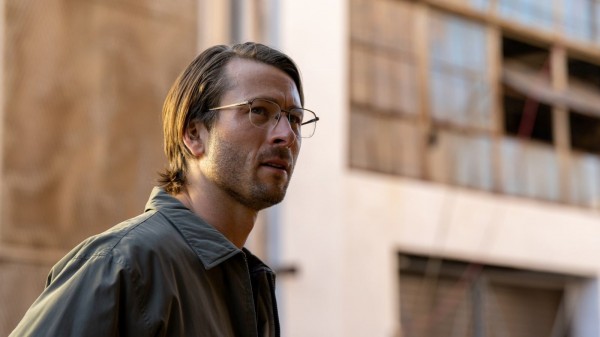
GLEN POWELL IN HIT MAN
A philosophy professor moonlights as a dummy hit man for the New Orleans cops, then it gets more complicated when he gets personally involved with one of his seedy targets.
A premise so good you have only not to get in the way of it, and Linklater mostly doesn't. This movie gives off the vibe of a neo-noir, but is too mild and has too much of a feel-good, harmless ending to live up to that. Nonetheless this is a very enjoyable, loosely-slung yet exciting confection that will be giving pleasure for a long time to come.
Hit Man is all about Glen Powell, an actor some of us were quite unaware of, and besides being one of Linklater's most accomplished and entertaining pictures in years, should make this engaging, sexy actor widely known. His sizzling costar the Puerto Rican born, Mexican raised Adria Arjona is another present but hitherto unnoticed actor, and this is essential to our feeling that we're spying on a startling situation. Powell is bland, but also big and hunky. As a sometime college lecturer plus fake hit man who assumes various disguises, he's a tabula rasa who can be made dangerous and sexy, and has a potential edge to him. In short, he's ideal for this role.
The capper is that Gary Johnson is a real guy who actually did these things. It's stated in the occasional voiceovers spoken by Johnson/Powell that the hit man is a myth, though understandably, hiring somebody to kil somebody else is a crime (though one a good lawyer can get you off of in court, apparently). So that makes it odd that according to Time, there are four new hit man movies this fall: Linklater's self-titled one and David Fincher's well received pro assassin tale The Killer, both successes at Venice, plus two others, Harmony Karine's "infrared" one Aggro Dr1ft and Michael Keaton's hitman-with-dementia movie Knox Goes Away. But then--is the hit man really a total myth? Surely in the mafia it hasn't been?
The basic element here in the New Orleans-based action has nothing to do wih the mafia. It's a guy who teaches college - here philosophy and psychology, urging his charges to see their identities as constructs capable of refashioning - who first starts moonlighting doing tech work on taping and wiring for sting operations and then is drawn in to replace the police department's fake hit man when he's suspended. The linchpin of this Hollywoodization of Gary Johnson's life is that the suspended cop returns and wants his job back, but the police keep him working on backup because he's too much of a wild card ((basically an asshole). And that of course means he's a wild card also in the romance that develops between "Ron" (Gary's fake hit man name) and Madison (Adria Arjona), the hotheaded and beautiful dame who comes to him to get her repressive, horrible husband killed. She is lovely and nice, and the version of "Ron" Gary has adopted for her is simply a sexier version of his real self (he uses various disguises to suit the hit applicants). He talks her into using her hit money simply to walk away from her abusive hubby and live a new life.
She does that. But of course the abusive hubby won't just go away.
This violation of protocol on "Ron"/Gary's part signals the mutual attraction of Ron and Madison, which bears the fruit of a hot affair that geets going once "Ron" checks back to see how Madison is doing. Then there's excitement of things threatening to get messy. Gary's police department handlers aren't happy with his violation of the rules of entrapment. (By the way, despite the philosophizing about identity, which relates to Gary-Ron's use of disguises and double life, this movie never considers the ethics of luring people into committing to a crime in order to arrest them - sting operations.)
What's good, and noirish of a sort, is that there is plenty of plot here, and with that, plenty of good dialogue. There is lots of talk (including the voiceover) and very little violence, only the threat of the latter, and none onscreen. Linklater and Powell, who previously worked with him on Everybody Wants Some!! and [I]Apollo 10 1/2[/I, cowrote the script based on an article of the same name about Gary Johnson by Skip Hollandsworth in Texas Monthly. The spirits of Quentin Tarantino and the early John Dahl hover around this tasty confection.
Hit Man, 113 mins., debuted at Venice Sept. 5, 2023, also sowing at Toronto, New York, and BFI London. Screened at this review as part of the NYFF where it shows Oct. 3 and 4. Coming on Netflix, to whom it reportedly sold at Toronto for $20 million. Metacritic rating: 83%. (Later 82%.)
Last edited by Chris Knipp; 09-18-2024 at 06:39 AM.
-
MUSIC (Angela Schanelec 2023
ANGELA SCHANELEC: MUSIC (2023)
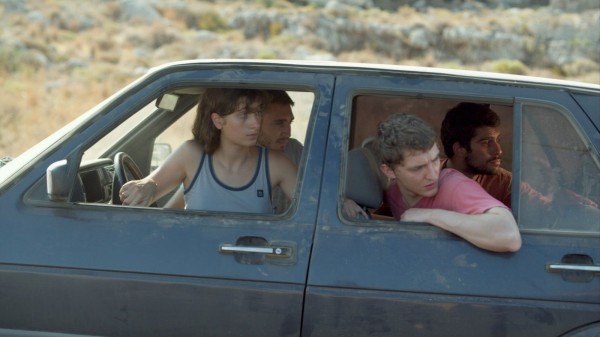
The baffling art film drama of this Sophocles-based contemporary German Berlinale Silver Bear winner starts with a romance between a prisoner and a prison guard
Jessica Kiang (Variety) calls this, Schanelec's tenth film (but the first one I've seen), a "riff" on Oedipus Rex that's "rewarding" but "radically mystifying." (She is, ultimately, very appreciative.)
But Shanelec rings changes on Sophocles, not least of which is that the Oedipus character avoids lasting repercussions from his grievous mistake, committed due to being abandoned as a baby and never knowing his origin, or his connection to the prison guard he falls in love with after being jailed for manslaughter.
She (Shanelec) is an "uncompromising formalist" whose work is another "beautiful and strange deep-niche arthouse artifact," Kiang writes. You have to know Shanelec is interpreting Sophocles going into this film to make sense of it, Kiang says, and makes clear that while Shanelec is caviar to the general, she has an enthusiastic cult following.
Jordan Mintzer (Hollywood Reporter) wrote about Music, reviewing the director's career. "While [I]Home[/I" (her previous feature)]"walked away with Berlin’s Silver Bear award in 2019," Mintzer said, "it’s hard to see Music doing the same, even if it will probably appeal to Schanelec’s admirers." He turned out to be partly mistaken: Music did win a Silver Bear, for its screenplay.
Peter Bradshaw of the Guardian also wrote about Music at the Berlinale. But while he describes its accomplishment as cinema favorably, and watched it to the end, he admits that Schanelec's refusal to render up meanings has defeated him in the past, and did so again this time.
Music can be seen as a palate-cleanser, or a challenge for cinematic puzzler-solvers. Readers are advised to consult these three cited reviews for more detailed descriptions of the film, which takes place mostly in Greece, starring French actors speaking fluent Greek. There are many long, still shots; much action takes place around the sea. The mentioned prison meeting recognizably occurs, and a car accident in which someone is killed. The leaps forward in time the reviewers describe can be observed. This is a world of sunshine, not darkness. Most shots are silent, many scenes with people lacking dialogue, but there are moments of uplifting baroque music and also live musical performances taht are very pleasant, including a short concert at the end. There is assurance in the images and editing, though it's hard to conceive of this as telling a story without consulting a shot-by-shot explanatory program as one watches. She knows what she is doing; we may not. It's a rather soothing, but baffling, watch. Music is an art film for its own self-defined audience of conoscenti.
Music, 108 mins., debuted in competition at the Berlinale Feb. 21, 2023, winning the Silver Bear for best screenplay. Also shown at Hong Kong and Istanbul. Screened for this review as part of the NYFF. Oct. 4 and 5, Q&A's with Shanelec. Metacritic rating: 72%.
Last edited by Chris Knipp; 10-03-2023 at 09:33 AM.
-
MAESTRO (Bradley Cooper 2023)
BRADLEY COOPER: MAESTRO (2023)
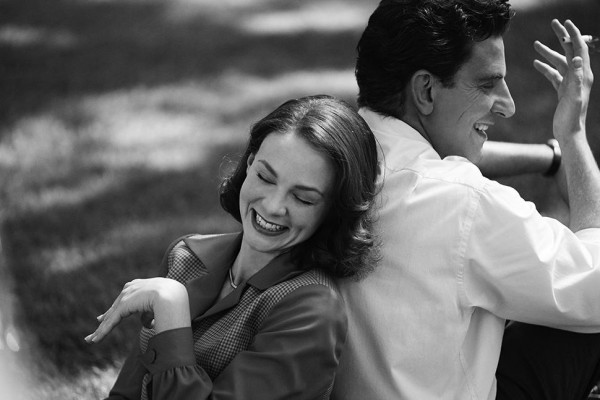
CAREY MULLIGAN AND BRADLEY COOPER in MAESTRO
The greatness, gay dalliances, and loving but fraught marriage of Leonard Bernstein in Cooper's classy followup to 'A Star Is Born'
Bradley Cooper's Maestro is a glitteringly elegant, precise portrait of the multitalented director, composer, and educator, with world-class, Oscar-worthy prosthetics and makeup. If there's hubris in the actor's directing himself as such a great American cultural figure, he nonetheless carries it off with panache.But in a sense the movie's not about him. It's about Felicia Montaleagre, Bernstein's elegant Chilean actress wife, and Carey Mulligan's brilliant performance in the role, elegant, tasteful, never mannered as she sometimes has been. This is a film with the limitations of its biopic elements, but it transcends that genre, and is very fine work, justifying the promise of Cooper's A Star Is Born remake directorial debut, justifying his alleged anointment by Marty or Spielberg to take on this project, for which they've given their producer blessing, their judgement proven right here.
This is the portrait of a marriage, a marriage at the heart of American and New York culture (if they can be said to coincide) lasting from 1951 to Felicia's early death of cancer in 1978. The burden of this marriage is obvious. It is not only a fame and performing life for Lennie that overshadowed Felicia's being and accomplishments, but his dalliances with men. The film achieves a weariness and excitement that linger in the mind (perhaps also in the heart). There is glorious energy, thrusting, confident mise-en-scène to match the bold simulacrum of makeup and voice and the recreation of boisterous joie-de-vivre of Leonard Bernstein that Cooper achieves.
Sometimes it feels like the picture is shying away from the main burden of its subject that clouded the marriage, as timid and closeted about gayness as the forties and fifties when the story begins. Yet this is not fair or true, because the complexity is there, and one winds up making excuses and learning to understand the repressiveness of a period and why this film is true to it. Owen Gleiberman's admiring Variety review is a good post-viewing place to begin in understanding Maestro. Gleiberman provides both a thorough description and a magnificent apology. He makes us understand how well all the things Leonard Bernstein, as "the first American conductor on a level with European legends like Arturo Toscanini," operated on so many levels, and his wild exuberance - expressed by the natural glow and sparkle of Bradley Cooper's eyes, no prosthetics needed for that - was part of a breaking of barriers that took him, with his oversize personality, beyond great musical gifts to superstardom. The film is too sophisticated to bother showing it, but Lennie became as much a household word as Albert Einstein. If Maestro works as it's well-programmed to do, it will provide hints to virgin youthful viewers of why this man remains an icon.
The movie begins in color, then goes to black and white (such binary visuals being the useful cliché of our moment now), also framing in intimate square ratio. The opening is a melancholy strain on solo piano, Bernstein's own composition like most of the film, heard before we see Lennie as a low-lit figure bent over the keyboard, it's after Felicia's death, it's a filmed interview, and he's saying how much he misses her, and his head bows down in silence after the playing. It's a great, unexpected way to begin . It declares this is not a biopic but the portrait of a marriage. But next we go to a virtuoso black and white sequence when Lennie, who hasn't met Felicia, is in his bedroom with his dreamboat lover David (Matthew Bomer), and runs through the apartment and right into Carnegie Hall. Age 25, he has gotten the big break, called in as an assistant conductor to replace maestro Bruno Walter who's taken sick, and he makes a brilliant debut, with no practice, and gets immediate recognition.
From this we go not to "West Side Story," but "a backstage riff on 'Fancy Free,' the 1944 ballet created by Bernstein and Jerome Robbins." Gleiberman points out how Cooper's screenplay written with Josh Singer (who seems to have cut his teeth on "The West Wing") continually avoids the obvious bio beats while still painting a rich, complete portrait, hardly even showing Lennie conducting until a grand, full-bore scene of Mahler in a cathedral after Felicia is dead showing how absolutely go-for-broke and magnificent Bernstein still was in his late years, the big mane of hair still shaking turned to gray, one hand still perpetually holding a lit cigarette, even when conducing a rehearsal. (This is painful to watch, but true.)
My enthusiasm is influenced by lifelong admiration of the man, not so much as a great conductor, though technically he was one, departing from the stick-figure metronome and showing how leading a symphony orchestra could be balletic and inventive, but as a great musical personality, communicating his enthusiasm and making things like his difference with Glenn Gould over the tempo of a Brahms concerto a matter of humorous but insistent controversy. The man was a force of nature, and made for great television. He communicated to all ages and persuasions. He was a public art intellectual, if there can be such a thing, in contrast to the testy political kind.
It was also an influence to see this film in what may have been the most eagerly and fully attended press screening of the New York Film Festival so far, with the audience, for a change, as pin-drop silent as attendees of a Paris cinema or theater would be. This is not a gushy crowd; it provides no ovations. But attention was paid. And this benefitted the tense moments like the big Thanksgiving argument, when Lennie has gotten sloppy, cruising his next young man openly at a party, and Snoopy both inside and outside in the parade signal the outsize egos and tragicomic mess this fraught marriage - not just of convenience, but of persistent love - has become. This, and so much more, are contained in this artful and sophisticated film.
One of the year's best American movies and a must-see.
Maestro, 129 mins., debuted at Venice, also showing at New York, Zurich, also at the New York Film Festival where it was screened for this review. Shown in the NYFF Oct. 2, 13, shown at both Walter Reade Theater and in the David Geffen concert hall, current home of the New York Philharmonic of which Bernstein was the director from 1958 to 1969. It was produced by Martin Scorsese, Steven Spielberg, and Cooper, among others, it is destined for multi-nation internet release by Netflix (Dec. 20). Metacritic rating: 80%.
(See Bernstein himself in a late interview here.)
And here is a collection of a wealth of audio-visual material entitled "Leonard Bernstein's New York, New York."
Last edited by Chris Knipp; 01-13-2024 at 04:37 PM.
-
GREEN BORDER (Agnieskza Holland 2023)
AGNIESZKA HOLLAND: GREEN BORDER (2023)

STILL FROM GREEN BORDER
Refugees treated as pawns by brutal authoritarian leaders across the Polish-Belarus borders
Agnieszka Holland's harrowing new film is a closeup of a piece of the world refugee crisis from multiple viewpoints. Helped by two other directors, Kamila Tarabura and Katarzyna Warzecha, she crafts a docudrama focused primarily on a Syrian family, father, mother, grandfather, kids, young sister, and a single bespectacled Afghan woman who speaks English, not Arabic. We meet them on a Turkish plane and the Arabic speakers naively think they can go through Poland to Sweden, where the family have a relative living. The Afghan lady wants instead to be given refuge in Poland. Instead they become pawns in a brutal game.
When they get to Belarus, and take a taxi prepaid from Sweden to Poland, they wind up first extorted, then tossed back and forth across a barbed wire line camping precariously in the woods - the "green border." The two ultimate villains behind their cruel treatment are Alyaksandr Lukashenka, the dictatorial leader of Belarus, and the no more admirable Polish leader Andrzej Duda. The brutality with which they are treated by the guards on both sides, the suffering of the young children and older man, are difficult to watch. In an omnibus review from Toronto, Brian Tallerico calls this film "a movie that many people probably couldn’t get through, but they probably should."
Holland and her cowriters Maciej Pisuk and Gabriela Lazarkiewicz have more up their sleaves, and they shift their focus for a while, after the mistreatment of the refugees has become impossible to watch any more, to others in the equation. There is the young Polish guard, Jan (Tomasz Wlosok)and his pregnant wife (Malwina Buss). The parallelism is a little too obvious since there are several pregnant women among the refugees subsequently shown, one of whom, an African woman, gets particularly brutal treatment. We see the young Polish guard with his wife. Then Jan is present for a pep talk from an officer who says the refugees are being used as weapons by Belarus’ President Alexander Lukashenko and Russia’s Vladimir Putin; he encourages the guards to treat them as objects and regard them as scum. But Jan starts to drink heavily and suffers psychological torments from this job, though he refuses to quit, thinking thework a national duty.
Another of the fragmentary "chapters" takes us to "activists," who seek to help the refugees in the "green border" forest interzone without breaking laws. But we also follow a woman shrink Julia (Maja Ostaszewska), a recent widow whose two dogs are her main emotional contacts. She joins with the activists, but her conditioned empathy, and perhaps a sense of privilege and the lack of immediate family she needs to protect, lead her to break the rules and take outsized risks, causing her own temporary arrest and making her too visible to provide haven for refugees in her ample hous.
There is a memorable sequence where some young French-speaking African boys are taken into a posh Polish house and sing rap with a Polish kid. Showering and dressing beforehand, they realize they "smelled bad," but, once cleaned up, they have enough juice left to enjoy themselves and bond. However in another brutal episode, some of the original group get mired in a swamp and children die - a sequence as painful to witness as the brutal beatings earlier.
It sometimes feels that this intense, well-staged, well-photographed film has attention deficit disorder. Boyd van Hoeij, writing from Venice for The Verdict, is not happy with the film's structure. He considers Green Border to be "hindered by" both "extremely predictable character development" and "a mosaic-like approach to narrative," that impairs our ability to "really get to know" or "emphasize with" any of the characters.
Krzysztof Kieślowski's "Three Colors" trilogy shifts around somewhat this way to compelling effect: it's just hard to do and requires a certain panache. Another multiple plot composition that succeeds impressively is that of the 1989 British miniseries "Traffik," where action switches back and forth between Afghan and Pakistani growers, dealers and manufacturers, German dealers, and British users. "Traffik" does this with a sense of drama, of art, and of entertainment. The writing of Green Border isn't on that level; isn't equal to its authenticity of mise-en-scène and casting, its awareness of current politics, and its moral sense. We feel deeply for the suffering of these abused and toyed with human beings, and we wish Green Border were as well made as it is urgent.
Recent Holland films I have reviewed are Burning Bush, Spoor, Mr. Jones, and Charlatan. An earlier favorite is the one about Rimbaud, Total Eclipse, for its go-for-broke performance by the young Leonardo DiCaprio; and, of course Europa Europa. Recently she has done a lot of television, including several episodes of "The Wire." Green Border is a TV series hastily assembled into a feature film.
Green Border/Zielona granica, 147mins., debuted at Venice (where it received the Special Jury Prize), also featured at Toronto, AFI, New York (where it was screened for this review Oct. 4, 2023) and Chicago. At the NYFF is shows Oct. 4 and 5, including Q&A's with Agnieszka Holland. Metacritic rating: 8̶5̶%̶ 83%.
Last edited by Chris Knipp; 03-06-2024 at 11:08 AM.
-
PICTURES OF GHOSTS/RETRATOS FANTASMAS (Kleber Mendonça Filho 2023)
KLEBER MENDONÇA FILHO: PICTURES OF GHOSTS/RETRATOS FANTSMAS (2023)

INTERIOR OF A RECIFE PICTURE PALACE IN ITS HEYDAY FROM PICTURES OF GHOSTS
Haunting images and haunted places: the Brazilian director explores the sources of his inspiration
Menconça Filho memorably and spookily followed a world of menace and disorder in new Recife buildings fictionally in his 2011 debut feature Neighboring Sounds (ND/NF 2012). This time he crafts, with old footage, much of it his own, a personal documentary about fading remnants of culture in downtown Recife since the picture palaces, once idyllic places, went dark, preceding this by a pictorial review of family apartments, where he has shot his films over the years. Thus he flows from thoughts on his own movie-mad youth and his own family above to an eelegy for the lost communal culture of shared moviegoing - and what cinema owed to cinemas, and has lost as film "going" goes electronic and digital and solitary.
Speaking of apartments, Mendonça Filho's second, and more widely known film was Aquarius (NYFF 2016), which is about an imperious woman, magnificently played by Brazilian superstar Sonya Braga, who won't give up her apartment to developers. In speaking of this film, less structurally inventive than Neighboring Sounds, I said the film "shows how the apartment has acquired through decades of human use the quality of baraka as Robert Graves defined it in his Oxford Addresses on Poetry."
Mendonça Filho does this in even more detail, with lots of film illustrations, in talking about the family apartment, which remained occupied by him for forty years, and went through two major. remodelings, but still doubtless retained the underlying baraka from decades and decades of family use. Initially, when we see the old interior of the apartment, it's dark and cozy. We keep going back over it, people in it, his mother, siblings, the balcony and people watering the plants outside. We see and hear a lot about the apartment next door, with its swimming pool. It was invaded by termites, which caused the roof to collapse and got into the director's family apartment too. Off in the distance is the sea, and the big apartment buildings that have grown up as Recife has grown. All this is narrated in Mendonça Filho's own voice. And he tells us how he made movies here, with this apartment as the location, not just juvenile efforts but also mature work.
The film's second part shifts to Recife's city center, now in decline, and the handsome cinemas that once were important places of entertainment there. This section of the film is partly about cinema, partly about urban decline, partly fond memories of specific places, homes away from home if you like, inspirations and almost places of worship for young cinephiles and cineastes. Detailed visual explorations of the places, some archival, some Mendonça Filho's own footage shot over years, also include his visual records of Mr. Alexander, chief projectionist of one of the biggest theaters, whom the director filmed prior to his death two decades ago. While old movie palaces in America, most of them gone, tended to the baroque, those of Recife seem to have been of later vintage and more clean and modern-looking. Many were torn down and replaced by other buildings, some were converted into shopping centers - one, even while it was still a movie theater.
Mendonça Filho's skill is in creating magic, mystery, and fearful haunting out of the ordinary - a neighborhood or a long-inhabited family apartment. He does something like that in a coda to this evocative, richly personal documentary in which he takes a ride with a driver who tells him he has discovered a superpower: the ability to become invisible in place. And voilà! he finds himself in a driverless car. But no! The driver is still there, you can hear his voice. Simple, artisanal movie magic is the best way to haunt the viewer and plant lasting memories.
Mendonça Filo has crafted a most personal and original set of recollections. This splendid documentary confirms and elucidates his distinctive vision and whets the appetite for another feature, while providing one of the best guides to his work future students will ever see.
Pictures of Ghosts/Retratos Fantasmas ("Ghost Portraits," "Phantom Portraits"), 93 mins., debuted in May 2023 at Cannes Special Screenings. It was screened for this review as part of the New York Film Festival, where it shows Oct. 9, 2023 at 5:30 pm.
Last edited by Chris Knipp; 09-18-2024 at 06:40 AM.
-
JANET PLANET (Annie Baker 2023)
ANNIE BAKER: JANET PLANET (2023)
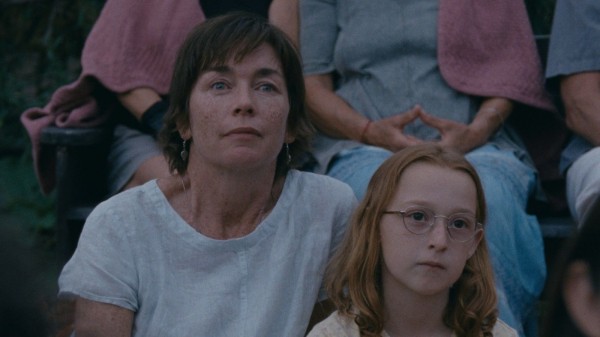
JULIANNE NICHOLSON AND ZOE ZIEGLER IN JANET PLANET
"Once again, A24 gambles on an unproven filmmaker, and once again, the indie studio comes away with an incredibly specific and personal glimpse into the mysteries of childhood." Peter Debruge, Variety. (Telluride.)
It has understandably received raves from reviewers for the major trade journals, but there are things that work and things that don't in this quirky and original directorial debut by the Pulitzer playwright Annie Baker in this portrait of a single mother and her perceptive but clingy 11-year-old daughter as they share summer '91 in Western Massachusetts - which hints at autobiographical elements. The intimate, precise little details of dialogue and boogers, hair lumps or a captured and executed tick and the score-free and pause-rich pace capture this world. But The Wrap's review by Tomris Laffly sums things up when it states that this A24 movie is "textured but wearisome." Janet Planet, as Peter Debruge writes, "is oddly structured and a bit flat (there’s no score, and the camera rarely budges)."
The odd structure is various, but starts with the question: who is this movie about? It's as if Baker couldn't (or wouldn't?) decide. At first all the focus is on the little girl, and you assume she must be Janet. But the little girl is plain, red haired, gold-rim-spectacled Lacy (Zoe Ziegler, spot-on). She gets taken out of summer camp early, apparently, because she thought nobody liked her, but as she waits to get picked up by Janet, who is her freckled mother (Julianne Nicholson), two girls are waiting to say goodbye and Lacy has got friends after all and would like to stay. But mom says no, because, for one thing, the camp has "agreed to return part of the deposit." (Janet is way off in the distance in this shot, by the way.)
The rather dry humor of this moment, which typically involves notable waiting and silences (and the aforementioned fixed camera position and lack of score), impresses for its own sake: it's a little showoff-y. It establishes the almost adult rapport of Lacy with Janet. This continues when Janet asks what she should do about her current boyfriend, Wayne (Will Patton), whose weird nighttime interpretive dancing (if that's what it is) and his prima donna behavior around a migraine, can't be cured by Janet's acupuncture treatment (use of curative needles being her livelihood, we learn). Janet asks Lacy what to do about Wayne. Lacy immediately advises to get rid of him. So again: whose planet it this? Maybe we should just say this is Annie Baker's planet and be done with it.
But it is "Janet's Planet" in that people come (and soon go) to be with Janet. This is signaled by inter-titles. Thus comes "WAYNE END." Then comes "REGINA" followed by "REGINA END." Regina (Sophie Okonedo) is an old friend Janet hasn't seen for years, who's out of dough and needs a job. Regina is met at a colorful, oddball group performance (tall, giraffe-like fantastical human-powered puppets; choral chanting) by a sort-of-cult led by a man called Avi (Elias Koteas), which Regina leaves to avoid Avi's clutches, to stay for a while with Janet and Lacy. But then, Regina gone after a spat, there is an inter-titled arrival of Avi himself in "Janet's planet," and he gives a little lecture (typically to Lacy as well as Janet) about the origin of the universe in Buddhist terns, something you could get in fuller form from an Alan Watts lecture recording. Janet, with Lacy's permission, goes on a walk and a country picnic with Avi. Hey presto! Avi vanishes in the middle of reciting a poem. AVI END.
A square dancing gathering is "a great way to meet people," so Janet goes to one, another seemingly authentic local event included in the film. Poor Lacy sits on the sidelines, refusing to dance and so lonely she wants to cry.
If you want to know where all this is going, perhaps the best answer is back to school for Lacy, whose entry into the sixth grade (with the "nice" homeroom teacher, we are happy to hear) is temporarily delayed when she gets sick. She almost throws up; yes, she's scared about going back to school but that isn't what made her sick. She lies on the floor and on the ground outside for a while. She refuses to take antibiotics and then apparently does take some.
This is a movie that seems almost to diminish in the mind afterward. Its slow scenes demand attention. It's observations are precise. Its style is distinctive enough to warrant adjectives like "exquisite" and "indelible" from prominent critics. But its episodic structure and lack of clear central focus leave one feeling it seem to collapse into itself and vanish, the way Avi does. Janet's periodic self-analysis, with conclusions that she's self-sabotaging, yet can easily captivate people, seem uninteresting, and not even true. But remember, this is an original and keenly observed film.
Janet Planet, 113 mins., debuted at Tellluride Sept. 1, 2023. Screened for this review Oct. 5 prior to the New York Film Festival Oct. 8 showing. Metacritic rating: 92%.
Last edited by Chris Knipp; 10-05-2023 at 04:44 PM.
-
PRISCILLA (Sofia Coppola 2023)
SOFIA COPPOLA: PRISCILLA (2023)
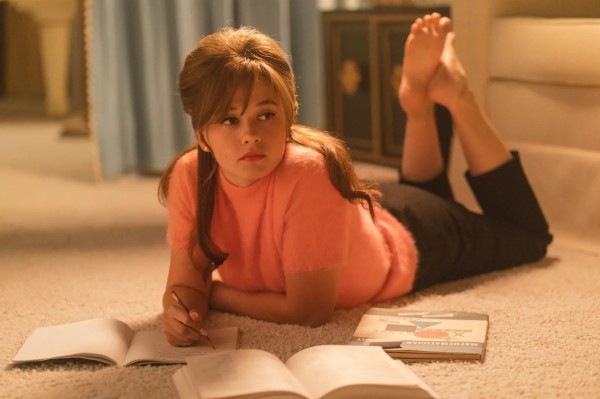
CAILEE SPAENY IN PRISCILLA (JACOB ELODI PLAYS YOUNG ELVIS) ]
TRAILER
The protected world of Elvis Presley's child bride.
Sixteen months ago we had Baz Luhrmann's lively but flawed Elvis with Austin Butler. This is something less obvious: the woman's angle, Elvis seen crabwise and through jaundiced eyes from the point of view of the child bride, with two excellent unknowns in the leads, breakout young Australian Jacob Elordi as Elvis and Missouri-born Cailee Spaeny as Priscilla. This, like Bradley Cooper's Maestro, is a portrait of a famous musical artist's flawed marriage, but this time all the spotlight is on the wife.
The thing that's most striking about Priscilla is how immaculate it is, how correct and polite everyone is. This film was shot in Canada, not on the biggest budget, in thirty days, and it's neat, tidy, with no rough edges, and so much the better for it - but do not look for grand scenes; some have complained that it's about nothing happening, a Waiting for Godot celebrity marriage, as it were. There are a couple of fights, when Priscilla has gotten too fed up with her situation to repress it, and Elvis is rough with her once when she seems uncooperative. But from the start he calls her "darlin'," and is sweet and tender. Warning: he is delicately objectifying her.
Sofia Coppola's elegant, restrained film lets things creep up very slowly, and even Priscilla's departure when she leaves Graceland for good in the film's final moment is quiet and discreet. All this shows how well Coppola's collaboration with her subject works. The film is based on Elvis and Me, Priscilla’s 1985 memoir of the marriage, but also on recent communications, and notably the living Priscilla, who was in touch with the director, was tearfully present at the Venice premiere and gave her blessing and said the filmmakers had "done their homework."
The two future lovers meet in 1959, a time of uniforms and dazzling big cars. Elvis arrives in a long black wing-tailed Cadillac that is to die for. Priscilla was 14, a ninth grader, and Elvis is 24, famous, already the world's number one rock superstar, with a constant entourage, but in the US Army. Both are in Germany, where Priscilla's stepfather, like Elvis, is stationed nearby, with the Air Force. Elvis, entranced by the girl's prettiness and the hometown Americanness he misses, arranges for the girl to come again, against the objections of the stepfather, who is carefully persuaded.
Jacob Elordi, who plays Elvis, is soft-voiced, often in shadow, as if to show the quietness of his menace, or to emphasize that this is not his story but hers. He is very tall (the actor is 6'5"), hovering above, pale, immaculately coiffed. Unlike Austin Butler, he doesn't get to do any leg-wobbling, hip-shimmying showoffs. No performing. He is just Priscilla's rich and incredibly famous husband who is dominant, controlling, and mostly away. Hie Elvis is as subtle and elegant as Austin Butler's is giddy and crowd-pleasing.
The dating period is sweet and tender. Priscilla falls in love. Elvis tells her she is special, "from back home," a comfort to him. But then when he goes back to the States and she remains in Germany there is a period when she thinks he has forgotten her. He has not, though. Again, true to the style of this film, what stands out is how smoothly everything goes; and how, astonishingly, he gets her stepfather, again reluctantly, to allow her to go and live at Graceland, continuing her schooling there. His bedroom is dark and elaborate (the filmmaker's invention: they found few records of Graceland's early interiors).
Priscilla now has a strange status that Peter Bradshaw describes in his Venice Guardian review as "infant sacrifice, bobbysoxer concubine," she is on hold, tenderly spoiled and cuddled - but no sex, at least not the "penetrative" kind, or any that we see - awaiting her moment to become the "child bride." Sofia Coppola's delicate staging defines this slowly evolving, rather strange status, strange to see so clearly defined in a movie, probably still much experienced in more traditional cultures even today, but far from the rom-com world. This is were Priscilla excels, and is memorable. It is also made clear even from Priscilla's first installation that Elvis is taking a lot of pills, uppers and downers, and sharing them with her. (The first time he gives her a downer, she sleeps for two days. He miscalculated.)
Priscilla goes to a Catholic girls school taught by nuns to finish high school. She is not a good student: she is too distracted by Elvis' nocturnal existence and she is warned by the head nun that she's in danger of not graduating. But when Elvis comes and visits the school - in one of the movie's few laugh-out-loud scenes - the nuns crowd around him, big fans like everybody else. Priscilla has persuaded him to wait outside for her graduation because his presence would have drawn all the attention.
It's only after a considerable time in this ongoing "bobbysoxer concubine" status that Elvis is ready to marry Priscilla. It's not stated but she is by then twenty-one, he, thirtyish, and right away there is a baby. But, of course, Elvis has been away much of the time: this was the period when he was making a lot of movies, whose kitsch B-picture quality he complains of; it's known that he had quite good taste in film, and he always wanted to study at the Actors Studio and seek a serious movie career like Brando and James Dean.. But Priscilla has a different complaint about Elvis' time in Hollywood: his wildly publicized affairs, notably Ann Margaret and Nancy Sinatra, which he pooh-poohs. Bradshaw says Priscilla has become "Memphis’s very own Lady Diana," with female Hollywood stars "in the Camilla Parker-Bowles role." Whatever is going on in Hollywood, Priscilla isn't a part of it.
Coppola's film is immaculate and delicate, but it will only be succeeding if it makes you uncomfortable. Most of all it will make you feel the frustration, the claustrophobia, the boredom of Priscilla Presley's confined life. She is never allowed to go on the bus to Hollywood, or performances, with the gang of male sycophants: she watches as it departs. She is not even allowed to play outside on the lawn. All her llfe is waiting, waiting, as she first got as strong taste of when Elvis left Germany and for a long time he didn't call or write.
For this reason this movie is not for everyone, and Austin Butler's jazzy performance in an inferior but entertaining movie will be an Elvis that's more fun and more the Elvis you want to remember. But this, like Cooper's Maestro, is a classy and unexpected portrait of an artist celebrity marriage. Priscilla is more critically acclaimed. But Maestro is a richer, more complex story and more intellectually stimulating. This film however is very germane to Coppola's interests. It has strong ies with Marie Antoinette and with her 2010 portrait of urban celebrity anomie and isolation, Somewhere. But Priscilla is more successful and has more mainstream appeal. It's up there, but not on the level of Lost in Translation or The Virgin Suicides.
Priscilla, 113 mins., debuted at Venice, where Cailee Spaeny won the Best Actress award. It was also shown at Zurich, New York, London BRI, Mill Valley, and some other festivals. Featured as the Centerpiece Film at the New York Film Festival, where it was screened for this review Oct. 7. US theatrical release is scheduled for Nov. 3. Metacritic rating: 82%.
Last edited by Chris Knipp; 10-09-2023 at 06:30 AM.
 Posting Permissions
Posting Permissions
- You may not post new threads
- You may not post replies
- You may not post attachments
- You may not edit your posts
-
Forum Rules





 Reply With Quote
Reply With Quote






Bookmarks